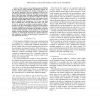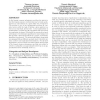1242 search results - page 162 / 249 » A Computational Complexity Theory in Membrane Computing |
101
click to vote
GECCO
2007
Springer
15 years 4 months ago
2007
Springer
An agent population can be evolved in a complex environment to perform various tasks and optimize its job performance using Learning Classifier System (LCS) technology. Due to the...
MST
2010
14 years 8 months ago
2010
Reductions and completeness notions form the heart of computational complexity theory. Recently non-uniform reductions have been naturally introduced in a variety of settings conc...
CCS
2009
ACM
15 years 10 months ago
2009
ACM
The successful deployment of a security policy is closely related not only to the complexity of the security requirements but also to the capabilities/functionalities of the secur...
CEC
2008
IEEE
15 years 4 months ago
2008
IEEE
— Many complex, real world phenomena are difficult to study directly using controlled experiments. Instead, the use of computer simulations has become commonplace as a cost effe...
GECCO
2007
Springer
15 years 4 months ago
2007
Springer
In the longest common subsequence problem the task is to find the longest sequence of letters that can be found as subsequence in all members of a given finite set of sequences....


